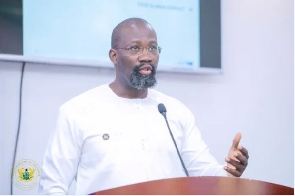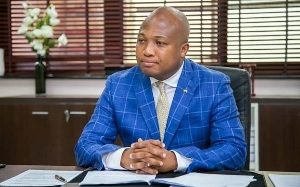The Bulk Oil Storage and Transportation Company Limited (BOST) is positioning itself to take advantage of a GH¢970million oil re-export market in landlocked nations within the sub-region. BOST, which recorded its first profit for 10 years in 2021 – a return of GH¢161million, said it can fully take advantage of the huge oil re-export market in Burkina Faso and Mali if non-tariff barriers are removed. These landlocked countries import petroleum products through Ghana, but BOST’s Managing Director, Edwin Provencal, said non-tariff barriers continue to frustrate efforts to fully capitalise the over-US$970million market. “Our focus for next year is re-exporting, which I’m very passionate about. Our absorption capacity for Ghana is small, but then, there is a US$970million opportunity in Burkina Faso and Mali. We want to tap into that,” Mr. Provencal said at a press briefing hosted by the Ministry of Information in Accra. To achieve this, however, the company is taking a multi-sectorial approach led by the Ministry of Energy and other partners. Critical to the plan is ensuring that non-tariff barriers which reduce trade are effectively dealt with. “The benefits of this will be huge; imagine we are getting US$450million out of this export. This is money we do not need the Bank of Ghana or Ministry of Finance to erode our reserves to give to BOST. This is money that will come to BOST as cash that we use to bring in the products. “So, in the next few years we are going to be heavily-focused on this; and we hope that obstacles in the re-export business will be dealt with,” he said. BOST has been exporting petroleum products to the two landlocked nations using its Bolgatanga depot in the Upper East Region, close to Burkina Faso; but now wants to go about it in a more deliberate manner under its aggressive export and expansion drive, he narrated. Cote d’Ivoire remains the country’s main competitor in the sub-region for oil re-export; however, Mr. Provencal said quality products and proximity give Ghana an upper hand. “Our quality is the best in the sub-region, and a lot of the countries would in the absence of any non-tariff barriers prefer Ghana to pick their products than Cote d’Ivoire. “The second competitive advantage is Bolgatanga; it is so close to the border. Today, a lot of them [buyers] travel about 900 kilometres to Accra and pick their fuel from the private depots; but if through the National Petroleum Authority we put the right regulations in place, it will limit their travel to Bolgatanga,” he said. He explained the oil re-export business is one with huge potential to deliver far greater value to the state-owned firm and the economy if deliberately implemented, just as in the case of Singapore. Even though Singapore is not surrounded by landlocked countries, he said, it has deliberately positioned itself for re-export. In 2021, Singapore’s oil re-export was equivalent to US$40billion. “Singapore’s total trade is US$1.2trillion out of which US$40billion comes from oil re-export. “In our case, we are so fortunate that we have a lot of countries which depend on Ghana because we are close to the sea. So, we have to be intentional about our re-export strategy because it can put us on a certain lever. “The critical thing is to remove the non-tariff barriers so that we can trade effectively, especially within the AfCFTA framework,” he said. The state-owned company imports, stores and transports petroleum under both social and commercial mandates.
Business News of Monday, 17 October 2022
Source: thebftonline.com
BOST to tap into US$970 million oil re-export market
Entertainment
















